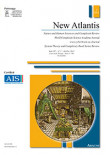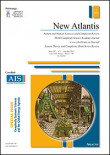
New Atlantis
| Direttore responsabile | Demetrio P. Errigo |
| Direttore Editoriale | Maria Rita Astolfi |
| Caporedattore | Gelsomina Chiara Trofino |
| Comitato di redazione | Serena Affuso, Mariarosalba Angrisani, Silvia Bertini, Marianna Caputo, Emilia Ferone, Lucia Maddalena Giraldi, Andrea Pitasi, Giovanna Porcaro Sabatini, Roberta Vacca |
| ISSN: | 2281-9495 |
| Periodicità: | Semestrale |
The Systems Theory is one of the most important intellectual protagonist of the XX century and on the eve of this third millennium. It stands as a powerful conceptual instrument for the socio-economical evolution of the society as we get from a series of studies: von Bertalanffy’s research on biology, Wiener and Ashby’s works, founders of the first cybernetic, Buckley’s pages about the theory of information, von Foerster’s study on the development of a second order cybernetic, Luhmann’s social constructivism, Laszlo’s holographic field, Crozier and Friedberg’s studies about the science of organization and Delattre’s epistemological reflections. As Delattre himself brightly writes: “the theory of systems aim to crumble away learning and to develop a methodology up to the challenges of complexity (…). After the phase of deconstruction of the old disciplines (…), today it needs to go to a new synthesis of knowledge through a principle of unification that has to be different from the old ones, because it has to be suited to the others level of learning” (Delattre, 1984) and, from this point of view, the theory of systems turned out as a smashing conceptual model even because of its evolutionary and adaptive plasticity, for example through the paradigm shift from a everything/parts logic to a system/environment logic. It reveals its great heuristic power in creating conceptual and interdisciplinary modelizations that are necessary to develop analysis of global scenario, evolutionary strategies also endowed with a suitable predictive system – on a probabilistic base – and tactic-operative problem solving interventions that made it applicable even in more popular variables as the one made by Paul Watzlawick and his colleagues. The theory of systems is also evolutionary itself – as Ford and Lerner’s wonderful researches testify – so it lends itself in creating conceptual glocal models able to manage the complex dynamics of globalization and localization, of integration and differentiation, that mark the self-organizational evolution of the living one. As Delattre sagely writes: “the interdisciplinary nature of the theory of systems implies the study and the comparison of the methods and concepts used by the different disciplines to isolate the common substrate that is able to build the frame of a more or less unified language (…); each language has to be, as much as possible, formalized, that is that its rules of internal combination must be sufficiently precise to eliminate as a maximum ambiguities, and this is a constant need in every scientific activity”. Thus, this Journal pays attention and is opened to interdisciplinary contributes that could offer chances of kuhnian revolutions and schumpeterianally radical innovation at level with the evolutionary challenges of the complexity of the actual global scenarios that are so rich of epochal thresholds and bifurcations (for example it is about having an oil based economy still or seriously activating alternative sources of energy, invocating creationist theories about origins and biological identity or opening ourselves to evolutionary jumps that imply a re-reading – with its threats and opportunities – of the chances of life of men in new forms) that our times own and in front of which the most tragic and risky decision would be not deciding at all.

SINTESI
PUBBLICAZIONI










